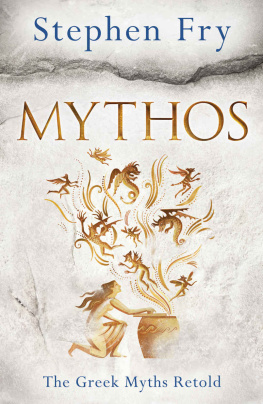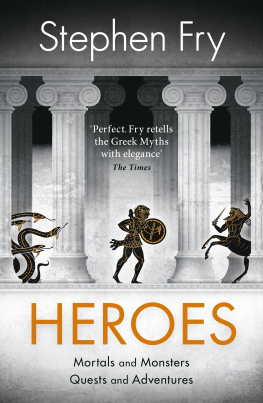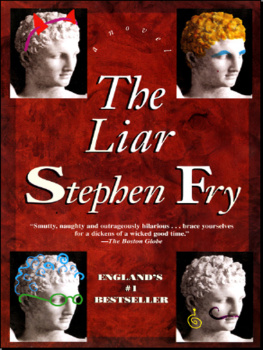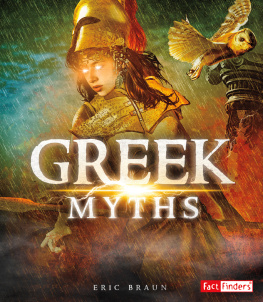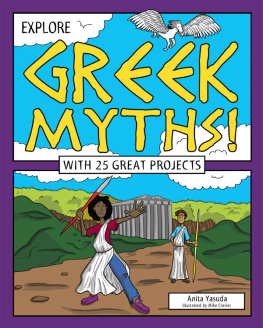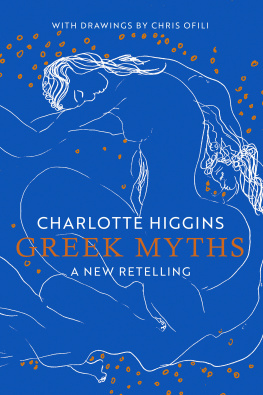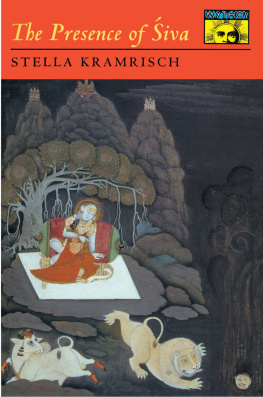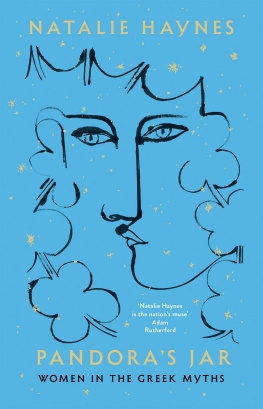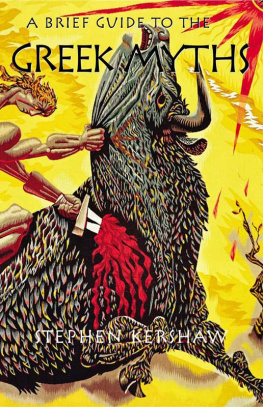Contents
Picture Credits
. Gaia, Mother Goddess Greek relief. Ancient Art Architecture Collection Ltd / Alamy.
. Attic Red-Figure Cup, bpk / Antikensammlung Berlin.
. Polyphemus, Johann Heinrich Wilhelm Tischbein, 1802. Landesmuseum Oldenburg.
. Bronze head of Hypnos, c.275 BC. British Museum / Alamy.
. The Mutilation of Uranus by Saturn by Giorgio Vasari, c.1560. Palazzo Vecchio, Room of the Elements.
. The Birth of Venus, Sandro Botticelli, c.1485. Uffizi Gallery. Florence / Bridgeman.
. Saturn Devouring One of His Sons, Francisco de Goya, c.1823. Prado Museum, Madrid / Alamy.
. Attic Red Figure attributed to the Nausicaa Painter, c.475 425 BC. Metropolitan Museum of Art, New York.
Nicolas Poussin, c.1640. National Gallery of Art, Washington DC. / Bridgeman.
. Marble Relief of the Battle of Giants, Gigantomachy. Getty Images / De Agostini Picture Library.
. Attic Black-Figured Hydria, c.540530 BC. Staatliche Antikensammlungen, Munich.
. The Dance of the Muses, Joseph Paelinck, 1832. Private Collection / Alamy.
. Relief of the Three Moirai. Alte Nationalgalerie, Berlin.
. The Battle Between the Gods and the Giants, Joachim Antonisz Wtewael, c.1608. Art Institute of Chicago /Bridgeman.
. The Gods of Olympus, Sala dei Giganti, c.1528. Palazzo del Te / Bridgeman.
. Hierogamy, unknown artist, 1st Century AD. Museo Archeologico Nazionale, Naples / Bridgeman.
. Vulcan Forging Jupiters Lightening Bolts, Peter Paul Rubens, 163638. Prado Museum, Madrid / Bridgeman.
after Greek original by Alkamenes, 420 BC. State Hermitage Museum, St Petersburg, Russia / Alamy.
. Venus and Mars, Sandro Boticelli, c.1485. National Gallery, London / Alamy.
. Black-figure Amphora, 6th century BC. Louvre, Paris / Bridgeman.
. Minerva or Pallas Athena, Gustav Klimt, 1898. Wien Museum Karlsplatz, Vienna / Bridgeman.
. Red-Figure Cup, 5th century BC. Louvre, Paris / Bridgeman.
. Apollo, Italian School, 17th century. Musee Massey, Tarbes, France / Bridgeman.
. Diana, Paul Manship, 1925. National Gallery of Art, Washington, DC, USA / Alamy.
. Prometheus Bringing Fire to Mankind, Friedrich Heinrich Fuger, 1817. Neue Galerie, Kassel, Germany / Museumslandschaft Hessen Kassel / Ute Brunzel / Bridgeman.
. Prometheus Bound, Jacob Jordaens, c.1640. Wallraf-Richartz-Museum, Kln, Germany / Alamy.
. Charon Crossing the River Styx, Joachim Patenier or Patinir, 151524. Prado, Madrid, Spain / Bridgeman.
John William Waterhouse, 1896. Private Collection / Alamy.
. The Return of Persephone, Frederic Leighton, c.1891. Leeds Museums and Galleries (Leeds Art Gallery) UK / Bridgeman.
. Cupid and Psyche, Francois Edouard Picot, 1817. Louvre, Paris / Bridgeman.
. The Fall of Phaeton, Peter Paul Rubens, c.16048. National Gallery of Art, Washington DC / Bridgeman.
. Drunken Silenus Supported by Satyrs, Peter Paul Rubens (studio of), c.1620, National Gallery, London / Bridgeman.
. Apollo and Marsyas, Michelangelo Anselmi, c.1540. National Gallery of Art, Washington DC / Bridgeman.
. The Spinners, or The Fable of Arachne, Diego Rodriguez de Silva y Velazquez, 1657. Prado, Madrid / Bridgeman.
Foreword
I was lucky enough to pick up a book called Tales from Ancient Greece when I was quite small. It was love at first meeting. Much as I went on to enjoy myths and legends from other cultures and peoples, there was something about these Greek stories that lit me up inside. The energy, humour, passion, particularity and believable detail of their world held me enthralled from the very first. I hope they will do the same for you. Perhaps you already know some of the myths told here, but I especially welcome those who may never have encountered the characters and stories of Greek myth before. You dont need to know anything to read this book; it starts with an empty universe. Certainly no classical education is called for, no knowledge of the difference between nectar and nymphs, satyrs and centaurs or the Fates and the Furies is required. There is absolutely nothing academic or intellectual about Greek mythology; it is addictive, entertaining, approachable and astonishingly human.
But where did they come from, these myths of ancient Greece? In the tangle of human history we may be able to pull on a single Greek thread and follow it back, but by picking out only one civilization and its stories we might be thought of as taking liberties with the true source of universal myth. Early human beings the world over wondered at the sources of power that fuelled volcanoes, thunderstorms, tidal waves and earthquakes. They celebrated and venerated the rhythm of the seasons, the procession of heavenly bodies in the night sky and the daily miracle of the sunrise. They questioned how it might all have started. The collective unconscious of many civilizations has told stories of angry gods, dying and renewing gods, fertility goddesses, deities, demons and spirits of fire, earth and water.
Of course the Greeks were not the only people to weave a tapestry of legends and lore out of the puzzling fabric of existence. The gods of Greece, if we are archaeological and palaeoanthropological about it all, can be traced back to the sky fathers, moon goddesses and demons of the fertile crescent of Mesopotamia todays Iraq, Syria and Turkey. The Babylonians, Sumerians, Akkadians and other civilizations there, which first flourished far earlier than the Greeks, had their creation stories and folk myths which, like the languages that expressed them, could find ancestry in India and thence westwards back to prehistory, Africa and the birth of our species.
But whenever we tell any story we have to snip the narrative string somewhere in order to make a starting point. It is easy to do this with Greek mythology because it has survived with a detail, richness, life and colour that distinguish it from other mythologies. It was captured and preserved by the very first poets and has come down to us in an unbroken line from almost the beginning of writing to the present day. While Greek myths have much in common with Chinese, Iranian, Indian, Maya, African, Russian, Native American, Hebrew and Norse myths, they are uniquely as the writer and mythographer Edith Hamilton put it the creation of great poets. The Greeks were the first people to make coherent narratives, a literature even, of their gods, monsters and heroes.
The arc of the Greek myths follows the rise of mankind, our battle to free ourselves from the interference of the gods their abuse, their meddling, their tyranny over human life and civilization. Greeks did not grovel before their gods. They were aware of their vain need to be supplicated and venerated, but they believed men were their equal. Their myths understand that whoever created this baffling world, with its cruelties, wonders, caprices, beauties, madness and injustice, must themselves have been cruel, wonderful, capricious, beautiful, mad and unjust. The Greeks created gods that were in their image: warlike but creative, wise but ferocious, loving but jealous, tender but brutal, compassionate but vengeful.
Mythos begins at the beginning, but it does not end at the end. Had I included heroes like Oedipus, Perseus, Theseus, Jason and Herakles and the details of the Trojan War this book would have been too heavy even for a Titan to pick up. Moreover, I am only concerned with

